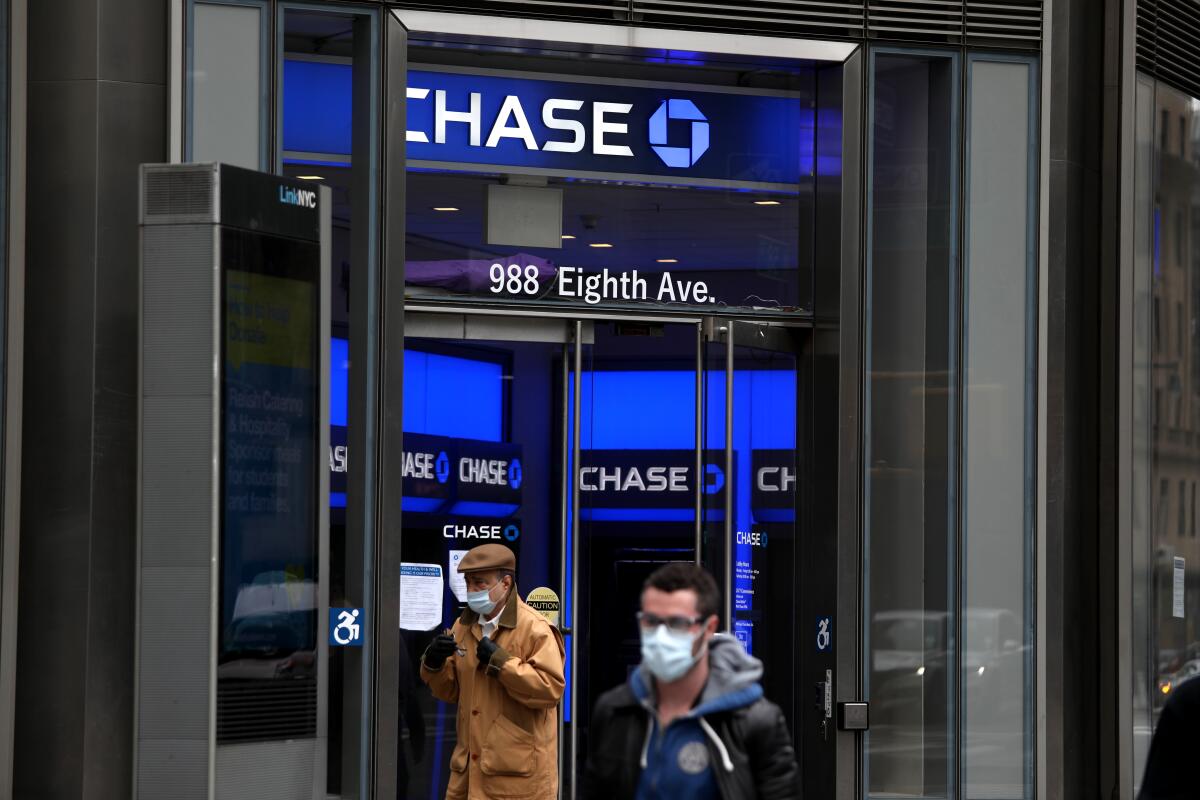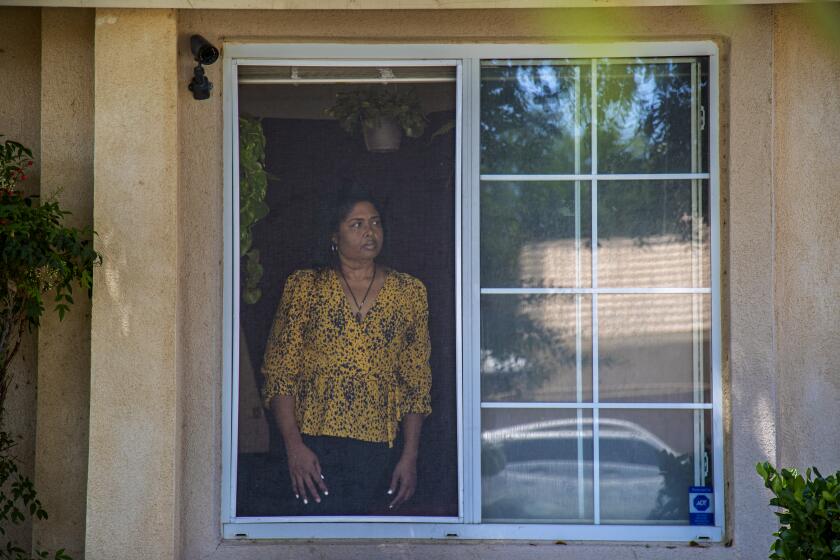Even if you want to buy a home, it’s harder now to get a loan. Or tap home equity

- Share via
While the number of home sales entering escrow has plunged amid the COVID-19 pandemic, some people are still touring homes virtually and willing — at a time of enormous uncertainty — to make the biggest financial investment of their lives.
What they are finding, however, is that lenders aren’t always willing to go along.
Mortgage credit is tightening. Some lenders are increasing FICO score and down payment requirements. One type of low-documentation loan has all but dried up. So-called jumbo mortgages, which in Los Angeles and Orange counties are those for greater than $765,600, have also grown rarer.
And two major banks have stopped issuing new home equity lines of credit — a potential source of funds for existing homeowners suddenly in need of cash.
Millions of homeowners have signed up for mortgage forbearance programs. But there is confusion and concern over how they will pay back what they owe.
“Lenders are concerned ... with the severity and the duration of what is going on,” said George Bahamondes, a real estate finance analyst with Deutsche Bank Securities Inc.
That can be seen in the data. The Mortgage Bankers Assn.’s Mortgage Credit Availability Index, which measures how accessible loans are to borrowers, has fallen sharply. The April index, released Thursday, was the lowest since December 2014 and a 12% decline from March. The March index had fallen 16% from February.
Tighter standards will block more people from taking advantage of extremely low mortgage rates, which last week averaged 3.26% for a 30-year fixed loan, according to Freddie Mac.
But Joel Kan, an associate vice president with the trade group, said credit still isn’t as tight as it was in the wake of the 2008 financial crisis. Back then, home prices had plunged, but many families were prevented from buying, losing out to investors who gobbled up cheap housing stock.
What happens next depends on how quickly the economy rebounds. More than 30 million Americans have filed for unemployment benefits, and the road to recovery is uncertain.
Experts said lenders are tightening standards because they fear they’ll take in less money, whether it’s because of defaults on existing and future loans or mortgage forbearance programs that allow borrowers to delay payments for up to a year.
“I wouldn’t be surprised if we got back to 2010-2011 type of tightness of credit,” Kan said.
Businesses might be able to open their doors again soon — but as they adapt to social distancing as a norm, can they keep on the lights?
One of the biggest contractions has been in loans that require minimal documentation to prove a borrower’s ability to repay and that can’t be sold to or insured by government entities. Such loans — often referred to as non-QM mortgages — are popular with self-employed borrowers who don’t get W-2 forms detailing their wages.
Some major non-QM lenders have announced they’ve stopped issuing loans altogether. That includes Irvine-based Impac Mortgage Holdings, which works with outside brokers as well as directly with borrowers under the name CashCall Mortgage.
Impac has cited uncertainty in the marketplace for its decision. Justin Moisio, the company’s chief administrative officer, did not respond to a request for comment.
Angel Oak Mortgage Solutions of Atlanta, another big non-QM lender, said it temporarily stopped making low-documentation home loans. It started doing so again last week, but with changes. A borrower needs to provide 24 months of bank statements from their business and have a minimum FICO score of 700. Before, only 12 months were needed and borrowers needed only a 600 credit score.
Angel Oak said the loans were always only for self-employed borrowers. Previously, loan seekers could qualify using a personal bank statement, but that’s no longer an option.
A catch in the Pandemic Unemployment Assistance program could disqualify many workers.
Data from the Mortgage Bankers Assn. show a sharp tightening of credit for jumbo home loans, and a smaller pullback for loans insured by the Federal Housing Administration and the U.S. Department of Veteran Affairs that allow for little to no down payment.
Though FHA and VA loans are insured by the federal government, Kan said private lenders that issue and manage the loans can still take a financial hit when they turn delinquent. That’s one reason they have added additional FICO and down payment requirements.
Tightening has also come to the less risky conforming market, in which lenders sell mortgages to Fannie Mae and Freddie Mac, the government-owned mortgage giants.
JPMorgan Chase & Co., for example, said that except for one type of loan for low- and moderate-income households, the bank now requires a minimum FICO score of 700 and a minimum down payment of 20% on its purchase mortgages. The company declined to say what the minimums were before but acknowledged they’ve been raised.
Chase, along with Wells Fargo, has also stopped issuing new home equity lines of credit, or HELOCs. Such loans are essentially a second mortgage and allow homeowners to borrow against their equity a predetermined amount at their discretion. That could be an attractive option for someone in need of cash but a risky bet for lenders if home prices plunge and the owner’s equity vanishes.
Don’t underestimate the downsides of taking a coronavirus hardship loan from your 401(k) or IRA savings.
Many experts aren’t yet forecasting a plunge in home values, though Zillow expects prices to drop about 2% to 3% before rebounding.
“The decision to temporarily suspend the origination of new HELOCs reflects careful consideration of current market conditions and the uncertainty around the timing and scope of the anticipated economic recovery,” Wells Fargo spokesman Tom Goyda said in an email.
Laurie Goodman, vice president of housing finance policy with the Urban Institute, said the tightening of credit is concerning because people who are still employed and can afford payments might miss out on the “single best way to build wealth” by buying a home.
In addition to tighter FICO and other standards, Goodman has data showing that lenders are charging higher interest-rate premiums for people with lower credit scores.
The Federal Housing Finance Agency, which overseas Fannie Mae and Freddie Mac, has taken steps to try to keep mortgage credit flowing in the conforming market, for instance by allowing the two mortgage giants to buy some loans that are in forbearance.
Pandemic or not, the ultra-wealthy are still buying and selling prized properties across L.A. County
Kan, however, noted that some conforming lenders are still tightening requirements to reflect the economic conditions.
Dave George, a Redfin agent in Orange County, said there is still demand to purchase homes, and by some indications it’s increasing. George said Redfin saw a jump in the number of in-person showings, which are allowed with proper social distancing measures, last weekend in Orange County. At the same time, many of his clients are locked out because they need a low-documentation loan and can’t find one.
“They are on the shelf right now,” he said. “They can’t get the financing they need.”
More to Read
Sign up for Essential California
The most important California stories and recommendations in your inbox every morning.
You may occasionally receive promotional content from the Los Angeles Times.











